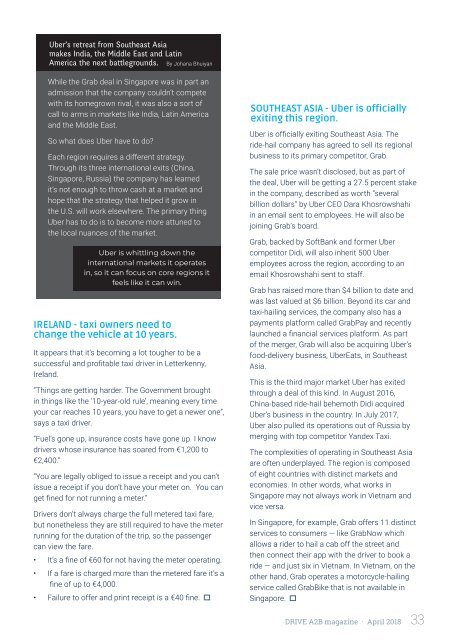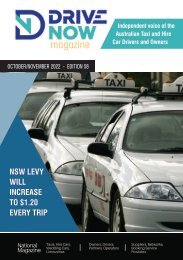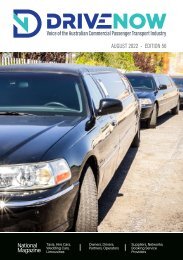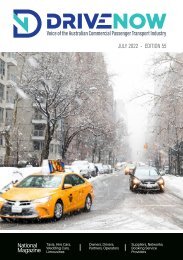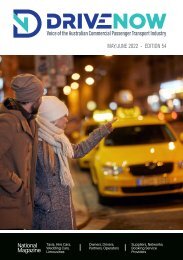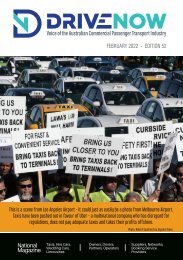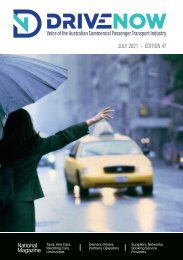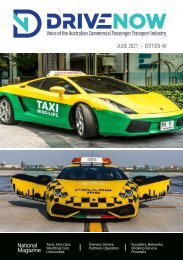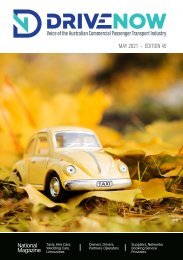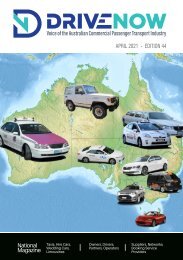DRIVE A2B April 2018
*** SCROLL DOWN TO SELECT ALTERNATIVE MAGAZINE EDITIONS *** Australia's only Magazine for the Commercial Passenger Transport Industry. News and views for Drivers, Owners and Operators of Taxi, Hire Car, Limousine, Ride Share, Booked Hire Vehicles, Rank and Hail Cars.
*** SCROLL DOWN TO SELECT ALTERNATIVE MAGAZINE EDITIONS ***
Australia's only Magazine for the Commercial Passenger Transport Industry.
News and views for Drivers, Owners and Operators of Taxi, Hire Car, Limousine, Ride Share, Booked Hire Vehicles, Rank and Hail Cars.
You also want an ePaper? Increase the reach of your titles
YUMPU automatically turns print PDFs into web optimized ePapers that Google loves.
Uber’s retreat from Southeast Asia<br />
makes India, the Middle East and Latin<br />
America the next battlegrounds.<br />
By Johana Bhuiyan<br />
While the Grab deal in Singapore was in part an<br />
admission that the company couldn’t compete<br />
with its homegrown rival, it was also a sort of<br />
call to arms in markets like India, Latin America<br />
and the Middle East.<br />
So what does Uber have to do?<br />
Each region requires a different strategy.<br />
Through its three international exits (China,<br />
Singapore, Russia) the company has learned<br />
it’s not enough to throw cash at a market and<br />
hope that the strategy that helped it grow in<br />
the U.S. will work elsewhere. The primary thing<br />
Uber has to do is to become more attuned to<br />
the local nuances of the market.<br />
Uber is whittling down the<br />
international markets it operates<br />
in, so it can focus on core regions it<br />
feels like it can win.<br />
IRELAND - taxi owners need to<br />
change the vehicle at 10 years.<br />
It appears that it’s becoming a lot tougher to be a<br />
successful and profitable taxi driver in Letterkenny,<br />
Ireland.<br />
“Things are getting harder. The Government brought<br />
in things like the ‘10-year-old rule’, meaning every time<br />
your car reaches 10 years, you have to get a newer one”,<br />
says a taxi driver.<br />
“Fuel’s gone up, insurance costs have gone up. I know<br />
drivers whose insurance has soared from €1,200 to<br />
€2,400.”<br />
“You are legally obliged to issue a receipt and you can’t<br />
issue a receipt if you don’t have your meter on. You can<br />
get fined for not running a meter.”<br />
Drivers don’t always charge the full metered taxi fare,<br />
but nonetheless they are still required to have the meter<br />
running for the duration of the trip, so the passenger<br />
can view the fare.<br />
• It’s a fine of €60 for not having the meter operating.<br />
• If a fare is charged more than the metered fare it’s a<br />
fine of up to €4,000.<br />
• Failure to offer and print receipt is a €40 fine.<br />
SOUTHEAST ASIA - Uber is officially<br />
exiting this region.<br />
Uber is officially exiting Southeast Asia. The<br />
ride-hail company has agreed to sell its regional<br />
business to its primary competitor, Grab.<br />
The sale price wasn’t disclosed, but as part of<br />
the deal, Uber will be getting a 27.5 percent stake<br />
in the company, described as worth “several<br />
billion dollars” by Uber CEO Dara Khosrowshahi<br />
in an email sent to employees. He will also be<br />
joining Grab’s board.<br />
Grab, backed by SoftBank and former Uber<br />
competitor Didi, will also inherit 500 Uber<br />
employees across the region, according to an<br />
email Khosrowshahi sent to staff.<br />
Grab has raised more than $4 billion to date and<br />
was last valued at $6 billion. Beyond its car and<br />
taxi-hailing services, the company also has a<br />
payments platform called GrabPay and recently<br />
launched a financial services platform. As part<br />
of the merger, Grab will also be acquiring Uber’s<br />
food-delivery business, UberEats, in Southeast<br />
Asia.<br />
This is the third major market Uber has exited<br />
through a deal of this kind. In August 2016,<br />
China-based ride-hail behemoth Didi acquired<br />
Uber’s business in the country. In July 2017,<br />
Uber also pulled its operations out of Russia by<br />
merging with top competitor Yandex Taxi.<br />
The complexities of operating in Southeast Asia<br />
are often underplayed. The region is composed<br />
of eight countries with distinct markets and<br />
economies. In other words, what works in<br />
Singapore may not always work in Vietnam and<br />
vice versa.<br />
In Singapore, for example, Grab offers 11 distinct<br />
services to consumers — like GrabNow which<br />
allows a rider to hail a cab off the street and<br />
then connect their app with the driver to book a<br />
ride — and just six in Vietnam. In Vietnam, on the<br />
other hand, Grab operates a motorcycle-hailing<br />
service called GrabBike that is not available in<br />
Singapore.<br />
<strong>DRIVE</strong> <strong>A2B</strong> magazine · <strong>April</strong> <strong>2018</strong><br />
33


